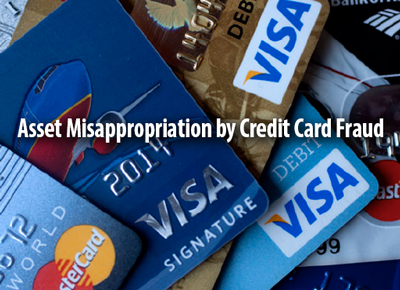 The Association of Certified Fraud Examiners recently issued its Report on Fraud to the Nation for 2014. The report cites three major areas of occupation fraud: asset misappropriation, corruption, and financial statement fraud.
The Association of Certified Fraud Examiners recently issued its Report on Fraud to the Nation for 2014. The report cites three major areas of occupation fraud: asset misappropriation, corruption, and financial statement fraud.
“Small businesses are both disproportionately victimized by fraud and notably under-protected by anti-fraud controls generally because they lack resources. The most prevalent fraud area is asset misappropriation committed by individuals with access to cash or its equivalent. The perpetrator is generally a male and the longer the fraud lasts the more financial damage is caused.”
If you are one of the many business owners that think it can’t happen to you, consider this case study:
Two businessmen establish a business together and form a partnership. One brings construction ability (Contractor) and the other professional expertise and organizational skills (Professional). Together, they build the business and contribute capital. A few years later, the Contractor wants to have his son (Junior) participate in the business and head up operations. Both original partners agree to sell stock totaling one-third of the business to the junior partner and receive monetary value for their stock. The partners allow Junior to operate the business. Later, Junior obtains an American Express Corporate Card in the name of the company and gives a card to the other partners. Unbeknownst to the Professional, Junior begins using the card to make purchases of a personal nature. (No company policy exists about the personal use of a credit card, so Junior isn’t breaking any rules.) The Accounting department questions Junior about his purchases, but he does not respond to them. Over time Junior’s expenditures increase significantly. Finally the accounting staff comments to the Professional, in passing, on Junior’s activities and his ongoing lack of documentation for expenditures. The Professional is astonished to hear about the monthly expenses Junior is incurring “on behalf of the company.” The Professional has a dilemma; does he confront Junior directly, or does he speak with the Contractor about his concerns?
What would you do? Would it make a difference if Junior were a family member? Regardless of DNA or professional relationship, the best defense against misappropriation is a good offense.
If you have this problem, or if you want to prevent this problem from developing in your business, obtain copies of all company credit card statements from accounting and review them for business verse personal expenditures. Ask accounting how they handle the charges on the books of the partnership and find out if some type of breakdown is presented by the partners. If not, call a partner’s meeting and hold a review of all credit card purchases from each statement. Request that in the future all partners help accounting by submitting a monthly breakdown of their expenditures for business and personal use. Develop a written policy that clearly defines limits on personal and expectations for reimbursement, eg., reimbursed if in excess of $100 per month. In the case study, Junior’s personal use should be refunded to the partnership until the agreed upon amount is repaid.
Possession of a corporate credit card should not be considered authorization to incur personal expenses without permission of the partnership and proper accounting. If the partners all receive a salary and Junior makes a personal, unreimbursed credit card purchase, then he is taking a draw and is exceeding his agreed upon compensation rate. In addition, he is siphoning revenue away from the company and essentially robbing the other partners. Proper accounting for credit card expenditures is as important as watching for checks to cash or the purchase of personal items via company check. Personal expenditures are not properly deductible on a tax return as business expense. Fraud may later be determined depending on the materiality of the non-deductible items, the intent and the number of year that such personal deductions were taken.
Sage Investigation is standing by to assist businesses owners, avoid problems like those created by Junior. Have your attorney contact Sage for an internal investigation, and any litigation support necessary. Sage can also provide expert witness testimony. Call Sage Investigations LLC at 512-659-3179 and let our 26 plus years of IRS experience work for you.


 Call
Call